
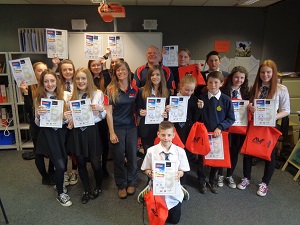 Since the discovery of the Galloway Viking hoard, Derek (McLennan) and I have been very busy implementing our ideas and vision for our company Beyond The Beep, and its direct involvement within the hobby we love.
Since the discovery of the Galloway Viking hoard, Derek (McLennan) and I have been very busy implementing our ideas and vision for our company Beyond The Beep, and its direct involvement within the hobby we love.
Beyond the Beep is, without doubt, a catchy name and Derek and I were really pleased with it as it represents the concepts behind our not-for- profit metal detecting company… that is until recently, when a young Scottish man (who was not a detectorist) complimented us on the name by saying, “That’s a really cool name for a company.”
We responded with sincere thanks. He then said, “But tell me this, what does the ‘Beep’ stand for?”
“Sorry. Don’t understand what you mean?” we replied.
“You know, ‘Beep’ as in swear words that are beeped over.”
We both looked at our company name with fresh eyes seeing this young man’s humour and point of view, and given all the frustrations in detecting, we now saw ‘Beyond the Beep’ as even more appropriate!
So, how did it all start?
Beyond the Beep started for us, after Derek gave a presentation (to a very full church of every age group) about the Viking Hoard he found in Dumfries and Galloway. Never before had I seen such enthusiasm and engagement about a find, albeit a spectacular one, and the idea began to form about what an inspiration detecting can be. Detecting encompasses a drive to succeed, a determination to better our finds rate and a passion to discover the hidden history of our past. If people could be this motivated by a single talk, why not create the opportunity for more people to take part in this fantastic hobby?
My background is in education and Derek’s is in business, so between us, we felt we had the necessary skill set to make this idea a reality. But where to begin? How on earth can we make this happen? Believe me, when I say that there were many, many ‘beeps’ along the way. Eventually, we found the right people, who were willing to give us the time to listen to our concept of using metal detecting for education, outdoor learning and therapeutic purposes. Anyone who is a detectorist understands the benefits of the hobby, but for those who are not detectorists, it takes a bit more convincing… and thankfully the people who could help us jump start this idea, quickly saw the potential.
Many meetings and conversations ensued with teachers, outdoor learning instructors, local council employees and a visit to Minelab in Ireland (who have been incredible in their support of this idea) and our vision was beginning to fall into place. The next issue was public liability insurance, which was a necessity if we were going to work with members of the public… ever tried phoning up insurance companies and saying ‘We are a not-for-profit company that wants to take young people and adults out detecting. Can you cover us for this?’
“What are the risks?” they replied.
Now here, I hesitated, should I tell the whole truth and nothing but the truth, or play all the worst case scenarios down…
I decided honesty was the best policy, “They could dig live ammunition, find a dead body, touch an electric fence, trip on uneven ground, dig something sharp and cut themselves, hit each other with heavy spades (I was thinking naughty school children here)…and before I had finished my long list of potential hazards, I was of course interrupted with a definitive “No. Sorry. We cannot cover that.’
BEEP!
I lost count of the hours I spent making calls to insurance companies or how many I even phoned, but eventually we found one that would cover the ‘risks’. So we had eventually got everything into place: equipment and support from Minelab, risk assessments (for the council we would be working in), public liability insurance, backing from the NCMD, official certificates, our responsible detecting programme, teaching manuals, PowerPoint presentations, permission from landowners, schools and teachers on board…yippee, at last, we could start our six week programmes and we set the dates to begin in both a primary and secondary school.
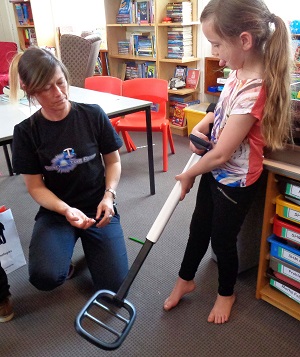
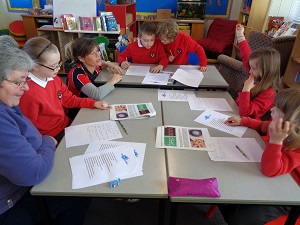
While all of this was underway, we also wanted to investigate the possibility of using detecting with Combat Stress, a charity which just happens to be near by our home, but this is also a charity that works nationwide to help veterans’ suffering from mental health issues with residential and outreach support available. We were both absolutely convinced that detecting could offer veterans both mental and physical benefits. Furthermore, after participating in our responsible detecting programme there was a wider community throughout the country, which would be there to support anyone that wished to take up detecting as part of their lifestyle. Detecting is a level playing field for each individual and this is why it also works well in schools - anyone can detect and enjoy the hobby no matter your age, sex, or background. But more on our Combat Stress work later.
Our first day at the primary school finally arrived and to be honest, we were both a little apprehensive about how it would go, we know all detectorists love detecting, but that does not mean that everyone else will love it too…
Upon approaching the school and seeing the field we were going to use for our first session, we noticed a large horse happily wondering about and as you can probably guess, this was an absolute no-no as far as our risk assessment was concerned: no detecting with any form of livestock in the field. I went into the school to get organised and Derek ‘volunteered’ to go and move the horse…twenty minutes later he came in red-faced and despondent reporting that under no circumstances would the beast move! The morning was ruined!
Undeterred, we hurried into the school. The pupils, were of course, very excited about the prospect of learning about detecting and before they had even started they were going to be disappointed. We decided to press ahead with the lesson which involved detecting responsibly, operation of the machine, digging a good clod and safely removing a target from the ground. After we had finished some of the theory work, we decided to venture out to the field. We had informed the pupils that our detecting session might not be able to go ahead as there was a horse in the field and they were unimpressed, “That’s just Holly the horse. She won’t touch us at all.” I didn’t go to the trouble of trying to explain risk assessment to a hugely exited group of young children and thankfully, Holly the horse had moved herself off to another field.
Derek and I had scanned the field previously and we had located over 100 targets, but we had no idea what lay beneath the ground. There was a buzz in the air as children began finding targets and this was when the hard work started. Under the risk assessment no hole was to be dug unsupervised and instead we had devised a system of flags, which were to be placed in the ground until one of us could supervise the digging. Soon there was a sea of flags across the field and it was all hands on deck to supervise the digging. The children were excellent at digging their clods and all sorts of goodies were being recovered, from coins to toy cars. Supervising over a dozen children with Minelab X-TERRA 305s, spades, flags and pin-pointers is not an easy task, and even with the help of the teacher and two classroom assistants it was literally backbreaking work.
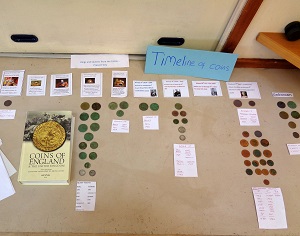
Of course, kids will be kids, and caught up in the excitement, one young girl had ‘forgotten’ about the no-digging rule. We discovered this when she let out a scream and shouted at the top of her voice, words that we will never ever forget, “GUN…I’ve found a gun. I’ve found a gun!” The words shot through me… (forgive the pun) and I looked up in horror to see the young girl holding a silver- looking gun above her head and waving it around frantically. In a millisecond the gravity of the situation flashed into my head, all the risk assessment and public liability discussions came to the fore and I could see the headlines in every newspaper around the world…Beyond the Beep would beep no more.
BEEP!
But in all honesty, I was terrified and ran at a very impressive speed, as did Derek and the other adults, but quick as we were, we could not beat 6 year olds and by the time I reached her, which was only a matter of seconds, she was surrounded by her classmates reaching for the gun which was still above her head:
“Can I see it?”
“Ooooohhhh cool!”
“Does it work?”
We disarmed the perpetrator with Ninja-speed and had the weapon in our hands. Her little face had crumpled, but much to our delight we discovered that it was a replica and a Roy Rodgers cap gun from the 1950s in full working order. Trust me, in those days they knew how to make toys, as from across the field it had looked so incredibly real. Needless to say, it was find of the morning and everyone now wanted to find a gun just like it! After that incident we reinforced the no-digging unless supervised rule and everyone then followed it religiously, which was a massive relief as that little girl had a penchant for dangerous finds. During another digging session she went on to find a lethal scalpel, formerly an old butter knife, now fashioned into a deadly weapon. And there you have it, we had been so worried about the kids enjoying it… they thought it was the best past-time in the world - it was fantastic, they could find all kinds of cool and dangerous stuff!
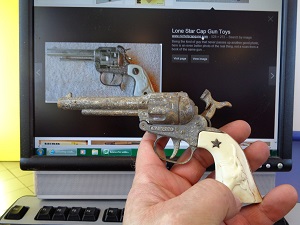
The project in the primary school ran over a six week period and during that time it was a combination of theory and practical work that also tied in with their current studies as part of the curriculum. During this period the pupils learned about many aspects of responsible detecting, from never going out alone, to more complex matters like scheduled monuments. At the end of the course they completed a number of questions about responsible detecting showing what they had learned and then they received their certificates. We were totally blown away by how the project went and it culminated in an open day to show educationalists, parents and the wider community what the pupils had achieved. Detecting really does have a place in the curriculum - it engages minds like no other method I have used, but we were unsure how much it would be appreciated by the teenage audience in our Secondary school course.
Looking back on our first day in the secondary school (we can laugh about it now) we failed to realise what a teenager would consider suitable outdoor clothing. Unfortunately, suitable clothing for all weathers, does not translate well into teen-speak. It appears to be understood as: a) not practical in any sense, b) not warm in any sense, c) not safe in any sense… I’m quite certain we would have been better off saying, “Turn up in clothes you wouldn’t normally be seen dead in,” and that would have done the trick perfectly. Being the tail end of winter, we quickly envisaged several hypothermic kids frozen to a field.
BEEP!
At first, the teenagers were reluctant to even wear their compulsory hi-vis vests as they were ‘not a cool look.’ We quickly pointed out walking around the school with a metal detector was probably not very cool either, and soon we were all outside and they had forgotten all about looking cool as they began to make their first finds. In fact, other pupils were also outside and they were so intrigued by what our twenty diligent detectorists were up too, it soon became apparent that it was indeed a cool thing to be doing at school. The ‘cool’ finds kept popping up; lots of modern coinage, an ancient Boys Brigade badge and a musket ball to name but a few.
We were based in the secondary school for one afternoon session per week over another six weeks, and this time our project was delivering the John Muir award. John Muir was a Scottish- American naturalist and conservationist, who dedicated his life to conserving large areas of America, such as Yosemite Valley. He is regarded as ‘The Father of the National parks’. The John Muir award is in his honour and recognises the concepts of ‘Explore, Discover, Conserve and Share,’ which we had incorporated into our programme and to be honest, it fits perfectly with responsible metal detecting.
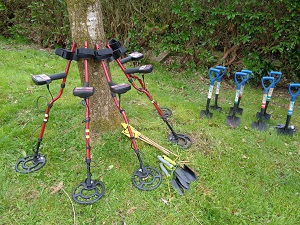
Over the weeks, and dressed more appropriately, the pupils thoroughly enjoyed the experience and the excitement of discovery that detecting brings - when they were allowed to take their finds home at the end of the course, even an old George VI half penny featuring the Golden Hind was being bartered for - detecting, as we had hoped, proved unanimously cool.
Two pupils later volunteered to help us out at the Festival of Museums, which incorporated the Go-Minelabbing day. It involved a token hunt for members of the public and we were very proud of the pupils for sharing their knowledge of detecting, operation of the machines and helping members of the public to dig proper clods; they worked tirelessly all day and their enthusiasm for detecting was obvious to see.
I suppose, when it comes down to it, this is what Beyond the Beep is really about. It is about giving people an opportunity they might never have, to experience a hobby they might never come across and through educational channels, we can help support responsible detecting. It may be years before any of them take up the hobby, or they may never do so. However, if they do, we know that through our programme they have had the right start and can go out into the detecting community to join all the other responsible detectorist out there finding history. We know this can happen, as this is exactly what has transpired with our Combat Stress veterans.
Any detectorist knows the mental and physical benefits that come from detecting - it teaches concentration and focus, opens up new areas of the country for discovery and lets you meet new people of a like mind. An additional benefit is that due to the physical nature of swinging a machine, walking for miles and digging holes all day, it soon knocks you into shape. Add to that the element of research and discovery and you have a winning combination in a hobby that has something to offer everyone.
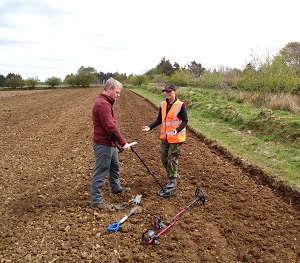
Our veterans were at first, just a little bit apprehensive - after all it is a bit stressful meeting new people in life and in this case we were going to be taking them out into a field to dig holes! But as usual, the magic of detecting works wonders and soon they were chatting away, asking for help and showing us their finds. In short, they loved it and so did we. It is great to see first-hand the effect detecting can have on people and mostly, it makes people smile: it allows success in small ways - this can be anything from identifying the tone of the target and digging it to discover you were right, that it was indeed a ring pull, or recognising your find as a Victorian doorknob! It really does not matter what you dig, it is about why you dig: it is about being outside, discovering new things and contributing to our past through responsible detecting.
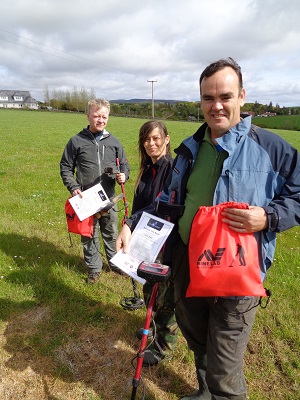
Our programme for the veterans started back in early March and like the school pupils, they also had questions to complete about responsible detecting to receive their certificates. About six weeks in they had their questions to answer, and despite being told a million times it was not a test, they had prepared so thoroughly that no-one used the booklet, they knew the stuff off by heart. The guys are still going out with us now, every two weeks, and two of them have loved the experience so much, they have taken up detecting in their own right. There are plans for a new intake and to keep the current veterans on a rolling programme of detecting in our local area. It is a significant achievement for them and for us: it has cemented everything we hoped Beyond the Beep could be, a not-for-profit company that could inspire people to consider taking up this wonderful hobby and go forward in their own detecting adventures with important knowledge about responsible detecting. Detecting is such an inspirational hobby which can be life enhancing, not though, for the treasures that we dig, but rather for the impact it can have on our lives, in a way we never dreamed possible. Beyond the Beep is about exactly that; promoting the hobby and reaching into other people’s lives with the hope that detecting might offer a positive influence and lead them on to their own path of success and discovery.